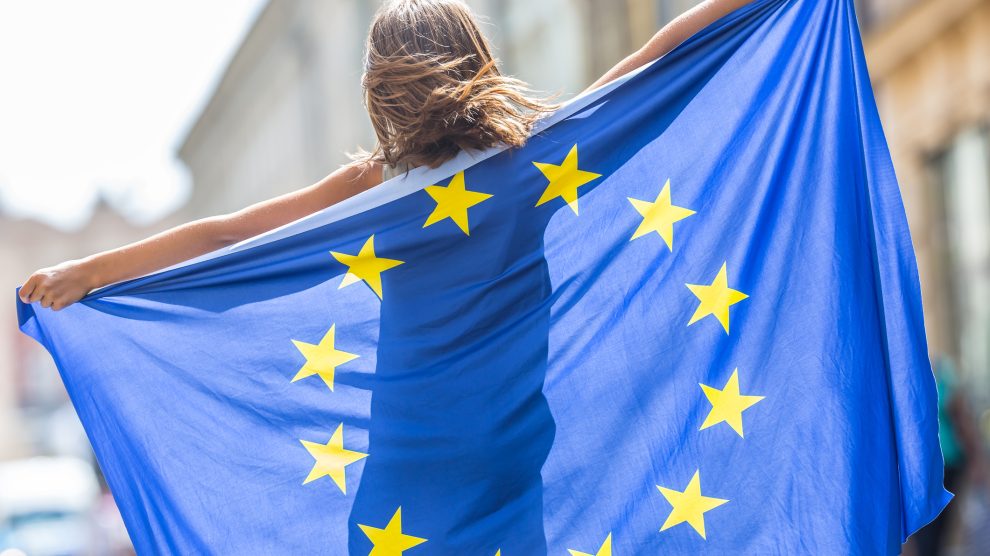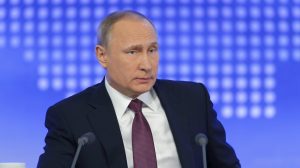In view of the 80th anniversary of the end of World War II and the 75th anniversary of the Schuman Declaration, Europe must seize this momentous occasion to pave the way for common defence and security, and a European Federation.
The German poet Friedrich Hölderlin wrote, “Wherein lies the danger, grows also the saving power”.
And indeed, a new European citizen spirit is emerging across the continent. We witnessed it on March 15, 2025, from Rome to Tbilisi, in Budapest, Bucharest, Belgrade, and in many other cities across Europe.
Support for European integration is high according to the latest Eurobarometer. It is a popular sentiment to defend peace, democracy and multilateralism, against imperialism, authoritarianism, and trade wars, and in support of the Ukrainian resistance and the European ideal.
Citizens understand that today the EU, like at the time of Brexit, is under threat from Vladimir Putin and Donald Trump, and their European minions. The European people are expressing a strong attachment to the European project and our common culture, but are also calling for concrete actions to ensuring our own security and defence, and therefore peace in our time, our competitiveness, our social model, and stronger political unity and capacity to act.
The EU institutions, and particularly its national governments, must provide an answer which is commensurate to the great geopolitical challenges we are facing, and the demands of the citizens.
In fact, almost 75 years ago, the Schuman Declaration already stated that, “world peace cannot be safeguarded without the making of creative efforts proportionate to the dangers which threaten it”.
This sentence strongly resonates in our time. The document also proposed an “action [to] be taken immediately on one limited but decisive point: (…) that Franco-German production of coal and steel as a whole be placed under a common High Authority, within the framework of an organization open to the participation of the other countries of Europe”.
An autonomous European Defence and Security System
We, members of the reconstituted Action Committee for the United States of Europe, believe that the setting up of a European Common Defence is today the clear and decisive point to be tackled in the European construction. This step is now a necessity, in view of Trump´s transatlantic security disengagement. On March 12, 2025, the European Parliament called the European Council to activate the different provisions of article 42 of the Lisbon Treaty to the said effect.
Such an important decision will pave the way for the creation of an autonomous European Defence and Security System (EDSS), endowed with its own chain of command and in charge of territorial defence, acting as the European pillar of NATO or otherwise in compatibility with it. Such an EDSS will not be dependent on the will and whims of the current US President, and it will operationalize the mutual assistance clause foreseen in article 42.7 of the Treaty.
We also need a larger EU budget financed with Eurobonds and new, own resources collected by the Union, to provide for our common defence and security needs and other European public goods, including the fight against climate change, among other critical challenges.
A renewed European financial framework should include the creation of investment instruments allowing EU citizens to directly channel their savings for these purposes.
We must remind member states that a true European defence and security framework cannot be reduced to the different national rearmament proposals currently on the table, which could also result in waste and inefficiencies if not properly coordinated at the EU level.
Moreover, security is multidimensional and should include tackling hybrid threats, cybersecurity, espionage and sabotage, etc. Finally, there will not be a proper European Defence and Security Union without the required political, strategic, and operational dimensions (such as planning, command-and-control).
Overcoming national vetoes
At the same time, the proposed step can generate strong political spill-over effects in European integration, including the opening of the process to reform the Treaties in accordance with parliament’s proposal of November 2023.
We must emphasise that any viable EDSS also requires overcoming as soon as possible the national vetoes and the intergovernmental approach, thereby ensuring the proper parliamentary and democratic control of the said security architecture. This is why we suggest the adoption of a ‘Union Act’ comprising the parallel activation of articles 42.2 (on common defence) and 48 (on constitutional reform) of the Lisbon Treaty as a common package.
Therefore, we propose that the French government, in coordination with the German, Spanish, and Polish governments, and other supportive member states, and the European Parliament, call on the European Council to adopt on May 9 the proposed Union Act.
The said governments shall make it clear that they will proceed to activate the Permanent Structured Cooperation (PESCO), foreseen in article 46 TEU, for the establishment of the autonomous EDSS if there is no quick unanimous agreement among the 27 member states. This institutional PESCO shall remain open to all member states willing to join.
Seizing the moment
In view of the 80th anniversary of the end of the Second World War and the 75th anniversary of the Schuman Declaration, we must seize this momentous occasion to pave the way for common defence and security, and a European Federation, as envisaged already in 1941 by the Ventotene Manifesto, and to join in the popular mobilisation in motion for Europe Day.
At the most dangerous geopolitical moment in Europe since 1945 we must not fall below the ambition mustered on May 9, 1950. The EU must live up to Europe.
Danuta Hubner, Former European Commissioner and former MEP
Domènec Ruiz Devesa, President of the Union of European Federalists, former MEP
Guy Verhofstadt, Former Prime Minister of Belgium and former MEP
Monica Frassoni, Former MEP
Enrique Barón Crespo, Former President of the European Parliament
Sandro Gozi, Former President of the Spinelli Group, MEP
Christelle Savall, President of the Young European Federalists
Philippe Laurette, President of the Association Jean Monnet
Photo: Dreamstime.






Add Comment